Copïau o ohebiaeth rhwng Llywodraeth Cymru a Natural England mewn perthynas â phecyn gwaith y rhaglen dystiolaeth polisi pridd.
Dogfennau
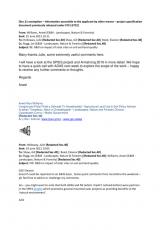
Dog 1 , Saesneg yn unig, math o ffeil: PDF, maint ffeil: 536 KB
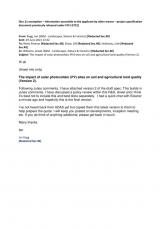
Dog 2 , Saesneg yn unig, math o ffeil: PDF, maint ffeil: 503 KB

Dog 3 , Saesneg yn unig, math o ffeil: PDF, maint ffeil: 637 KB
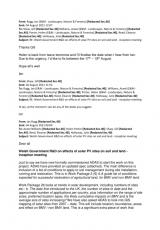
Dog 4 , Saesneg yn unig, math o ffeil: PDF, maint ffeil: 510 KB
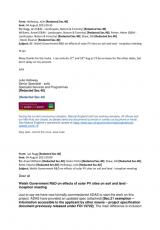
Dog 5 , Saesneg yn unig, math o ffeil: PDF, maint ffeil: 605 KB
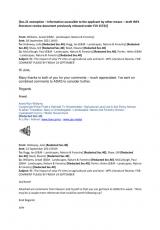
Dog 6 , Saesneg yn unig, math o ffeil: PDF, maint ffeil: 665 KB
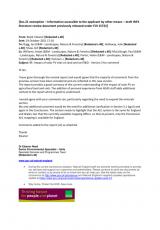
Dog 7 , Saesneg yn unig, math o ffeil: PDF, maint ffeil: 711 KB
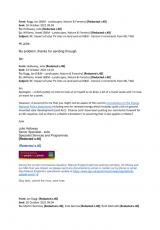
Dog 8 , Saesneg yn unig, math o ffeil: PDF, maint ffeil: 607 KB
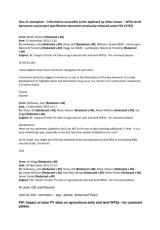
Dog 9 , Saesneg yn unig, math o ffeil: PDF, maint ffeil: 721 KB
Manylion
1 March 2022
Dear
ATISN 16039 – Potential Impacts of Solar Development on Land Quality.
Information requested
Thank you for your request which I received on 1st February 2022. You asked for:
‘A copy of all correspondence between the Welsh Government and Natural England in relation to the Soil Policy Evidence Programme work package SPEP 2021-22/03 – “The impact of solar photovoltaic (PV) sites on soil and agricultural land quality.’’
Our response
A copy of the information I have decided to release is enclosed.
I have decided that some of the information is exempt from disclosure under sections 21 and 40 of the Freedom of Information and is therefore withheld. The reasons for applying these exemptions are set out in full at Annex 1 to this letter.
Next steps
If you are dissatisfied with the Welsh Government’s handling of your request, you can ask for an internal review within 40 working days of the date of this response. Requests for an internal review should be addressed to the Welsh Government’s Freedom of Information Officer at:
Information Rights Unit,
Welsh Government,
Cathays Park,
Cardiff,
CF10 3NQ
or Email: Freedom.ofinformation@gov.wales
Please remember to quote the ATISN reference number above.
You also have the right to complain to the Information Commissioner. The Information Commissioner can be contacted at: Information Commissioner’s Office,
Wycliffe House,
Water Lane,
Wilmslow,
Cheshire,
SK9 5AF.
However, please note that the Commissioner will not normally investigate a complaint until it has been through our own internal review process.
Yours sincerely
Annex 1.
Application of exemptions
The Freedom of information Act provide a right for anyone to ask a public authority to make requested information available to the wider public. As the release of requested information is to the world, not just the requester, public authorities need to consider the effects of making the information freely available to everybody. Any personal interest the requester has for accessing the information cannot override those wider considerations.
I have decided to withhold the following information:
- Personal information in correspondence released such as telephone numbers, correspondence addresses, e-mail addresses have been redacted (Section 40 – personal information).
- Draft of documents for WP1, WP2a and project specification has previously been released under FOI request ATISN 15722 (Section 21 - Information accessible to the applicant by other means). A copy of response ATISN 15722 is available in our disclosure log at https://gov.wales/search?global-keywords=15722
Section 40 (2) – Personal Information
The Freedom of Information Act (FOIA) provides a general right of access to information held by a public authority. We are mindful that our response to requests for information should be purpose and identity blind, the identity of the applicant not being a factor. Therefore, we have processed this request in the same manner as one from any other member of the public seeking the same information.
Section 40 of the FOIA sets out an exemption from the right to know if the information requested is personal information protected by the Data Protection Act (DPA). We consider that names and contact details of officials and correspondents clearly fall within the description of personal data as defined by the DPA and that disclosure would breach the first data protection principle. The first data protection principle has two components:
Personal data is defined in Section 1(1) of the DPA as:
“personal data” means data which relates to a living individual who can be identified –
- from those data; or
- from those data and other information which is in the possession of, or is likely to come into the possession of, the data controller.
Under Section 40(2) of the FOIA, personal data is exempt from release if disclosure would breach one of the data protection principles. We consider the principle being relevant in this instance is the first.
The First Data Protection Principle
The first data protection principle has two components in relation to personal data. It provides:
- that personal data shall be processed fairly and lawfully; and
- its processing must meet at least one of the conditions in schedule 2 to the DPA.
Guidance from the Information Commissioner states:
“The first data protection principle entails a consideration of whether it would be fair to disclose the personal data in all the circumstances. The Commissioner determined that it would not be fair to disclose the requested information and thus the first data protection principle would be breached. There was no need in the present case therefore to consider whether any other Schedule 2 condition or conditions could be met because even if such conditions could be established, it would still not be possible to disclose the personal data without breaching the DPA” (paragraph 63).
The Information Commissioner has issued guidance on whether release of names of officials in disclosed emails would be unfair, and thus in breach of the first principle of the DPA. The guidance states:
In assessing whether employees can have a reasonable expectation that their names will not be disclosed, key factors will include their level of seniority and responsibility and whether they have a public facing role where they represent the authority to the outside world.
Where the officials and correspondents in question are not senior staff, do not have a public facing role and where they are acting entirely in an administrative capacity, I have concluded that they have a reasonable expectation that their names will not be disclosed. It is my view, therefore, that disclosure of their names and other personal data would breach the first data protection principle, and thus are exempt from release under section 40 of the Freedom of Information Act.
